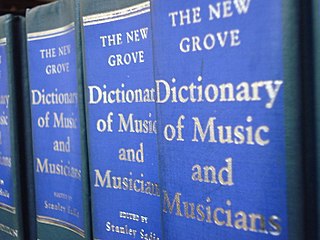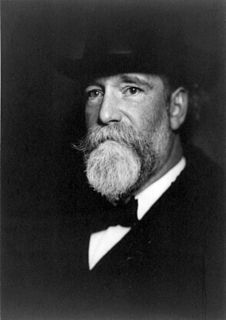Related Research Articles
Da capo is an Italian musical term that means "from the beginning". It is often abbreviated as D.C. The term is a directive to repeat the previous part of music, often used to save space, and thus is an easier way of saying to repeat the music from the beginning.

The New Grove Dictionary of Music and Musicians is an encyclopedic dictionary of music and musicians. Along with the German-language Die Musik in Geschichte und Gegenwart, it is one of the largest reference works on the history and theory of music. Earlier editions were published under the titles A Dictionary of Music and Musicians, and Grove's Dictionary of Music and Musicians; the work has gone through several editions since the 19th century and is widely used. In recent years it has been made available as an electronic resource called Grove Music Online, which is now an important part of Oxford Music Online.

A fermata is a symbol of musical notation indicating that the note should be prolonged beyond the normal duration its note value would indicate. Exactly how much longer it is held is up to the discretion of the performer or conductor, but twice as long is common. It is usually printed above but can be occasionally below the note to be extended.

Thomas Tertius Noble was an English-born organist and composer, resident in the United States for the latter part of his career.

Hermann Zumpe was a German conductor and composer.

Hiram Clarence Eddy was a United States organist and composer
Harry Rowe Shelley was an American composer, organist, and professor of music. Born in New Haven, Connecticut, Shelley studied with Gustave J. Stoeckel at Yale College, Dudley Buck, Max Vogrich, and Antonín Dvořák in New York, and completed his musical education in London and Paris. According to his New York Times obituary, Shelley "penned church music that won him wide popularity. For sixty years a host of English-speaking peoples throughout the world sang his hymns."

William Henry Grattan Flood was a noted Irish author, composer, musicologist, and historian. As a writer and ecclesiastical composer, his personal contributions to Irish music produced enduring works, although he is regarded today as controversial due to the inaccuracy of some of his work. As a historian, his output was prolific on topics of local and national historical or biographical interest.
The National Federation of Music Clubs (NFMC) is an American non-profit philanthropic music organization that promotes American music, performers, and composers. NFMC endeavors to strengthen quality music education by supporting "high standards of musical creativity and performance." NFMC headquarters are located in Greenwood, Indiana.
Attacco, in music, indicates a short phrase, treated as a point of imitation; and employed, either as the subject of a fugue, as a subordinate element introduced for the purpose of increasing the interest of its development, as a leading feature in a motet, madrigal, full anthem, or other choral composition, or as a means of relieving the monotony of an otherwise too homogeneous part-song. The name comes from the Italian attaccare, "to unite" or "to bind together."
Attacco (It.) A 'point' of imitation—that is, any short passage or figure proposed for treatment by imitation. In fugues the attacco is often made from a fragment of the subject or of the andamento, but is sometimes quite independent.

John Alexander Fuller Maitland was an influential British music critic and scholar from the 1880s to the 1920s. He encouraged the rediscovery of English music of the 16th and 17th centuries, particularly Henry Purcell's music and English virginal music. He also propounded the notion of an English Musical Renaissance in the second half of the 19th century, particularly praising Charles Villiers Stanford and Hubert Parry.

The English Musical Renaissance was a hypothetical development in the late 19th and early 20th century, when British composers, often those lecturing or trained at the Royal College of Music, were said to have freed themselves from foreign musical influences, to have begun writing in a distinctively national idiom, and to have equalled the achievement of composers in mainland Europe. The idea gained considerable currency at the time, with support from prominent music critics, but from the latter part of the 20th century has been less widely propounded.
Benjamin Hershey was a lumber and farming magnate in the U.S. states of Iowa and Nebraska during the middle to late 19th century.
Theodor Hagen [often spelled Theodore Hagen] was a writer on musical topics in Germany and the United States. He was a member of the local Communist League in Hamburg, Germany and took part in the publication and distribution of the Neue Rheinische Zeitung Politisch-ökonomische Revue.
Otto Floersheim [last name pronounced Flairs-hime] was a United States composer, critic and editor.

James Hotchkiss Rogers was an American organist, composer, teacher, music critic, and publisher.

Sara Hershey-Eddy was an American musician, pianist, contralto vocalist, vocal instructor, and musical educator. She founded the Hershey School of Musical Art in Chicago.

Mary Alice Fonda was an American musician, author, elocutionist, and critic. She was referred to as "Octavia Hensel" in the music world, where she was an internationally-known music critic. As a critic, Fonda was renowned. Her musical nature, her superior education, her thorough knowledge of the laws of theory and familiarity with the works of the great composers of the classic, romantic and Wagnerian schools, and the later schools of harmony, gave her a point of vantage above the ordinary. She was one of the original staff of writers on the Musical Courier, having been their correspondent from Vienna and other European centers.

Lillie Berg was an American musician and musical educator.

Maria Elise Turner Lauder was a Canadian teacher, linguist, and author who travelled extensively in Europe. She published novels and poetry, but mostly was known for writing about her travels. Lauder was also a philanthropist, involved in the temperance movement.
References
![]() This article incorporates text from a publication now in the public domain : G. Grove and J. A. Fuller-Maitland's Grove's Dictionary of Music and Musicians. Supplement (1922)
This article incorporates text from a publication now in the public domain : G. Grove and J. A. Fuller-Maitland's Grove's Dictionary of Music and Musicians. Supplement (1922) ![]() This article incorporates text from a publication now in the public domain : J. S. Dwight's Dwight's Journal of Music (1878)
This article incorporates text from a publication now in the public domain : J. S. Dwight's Dwight's Journal of Music (1878)
- ↑ Grove & Fuller-Maitland 1922, p. 239.
- ↑ The Courier 1881, p. 139.
- ↑ Hotchkiss 1898, p. 620.
- ↑ Dwight 1878, p. 4.